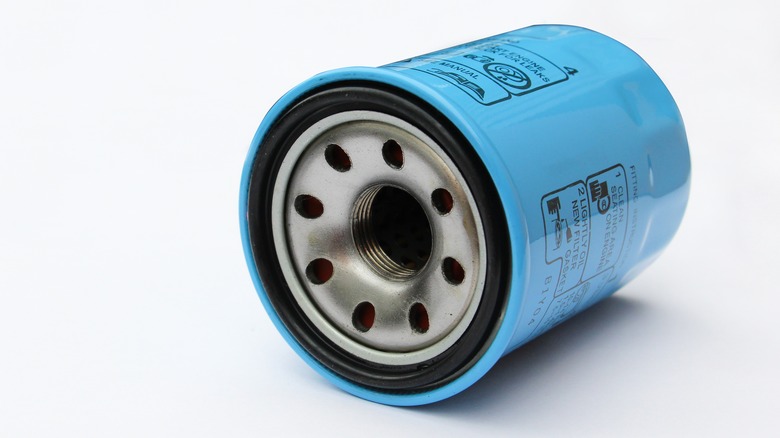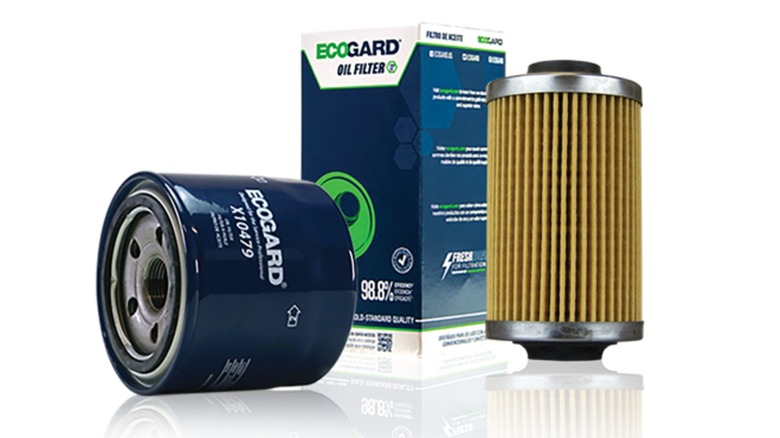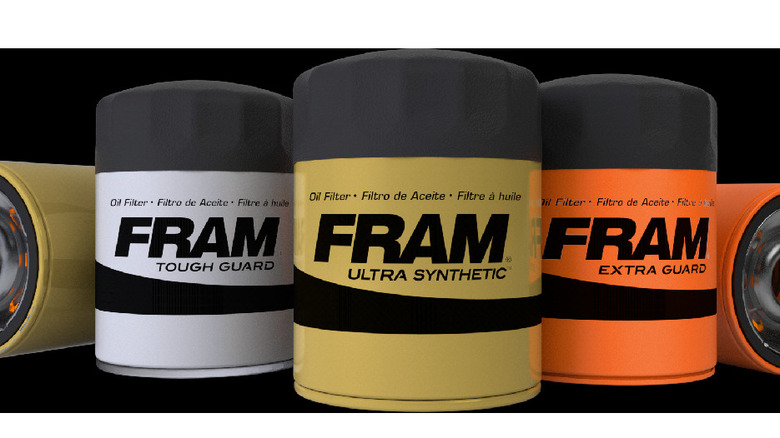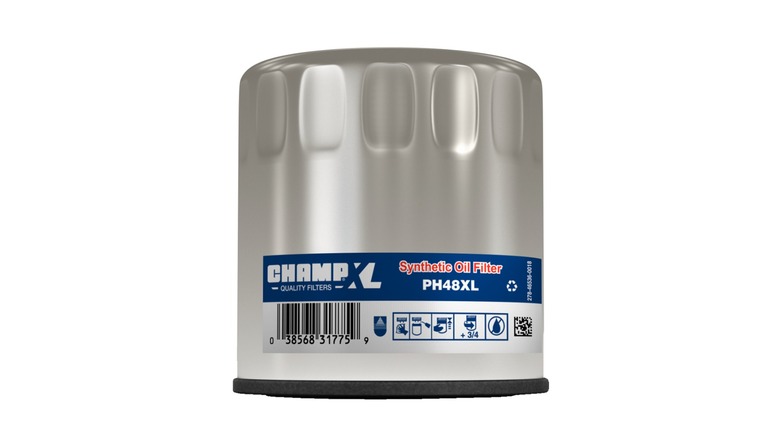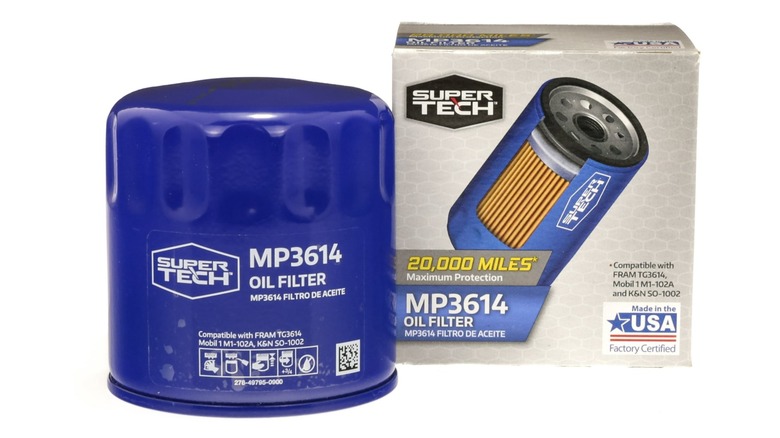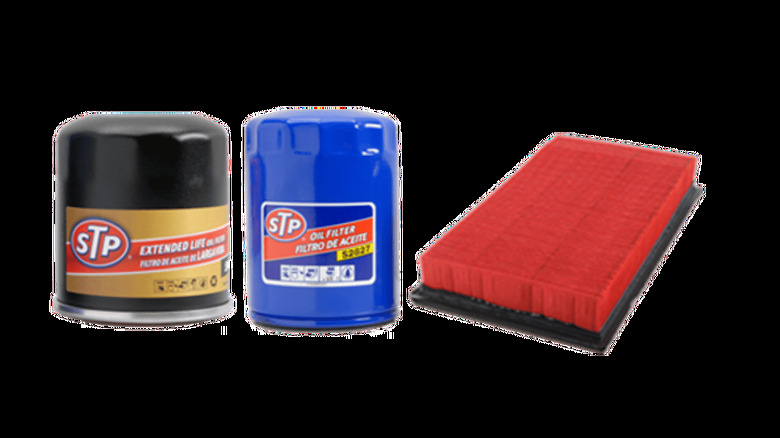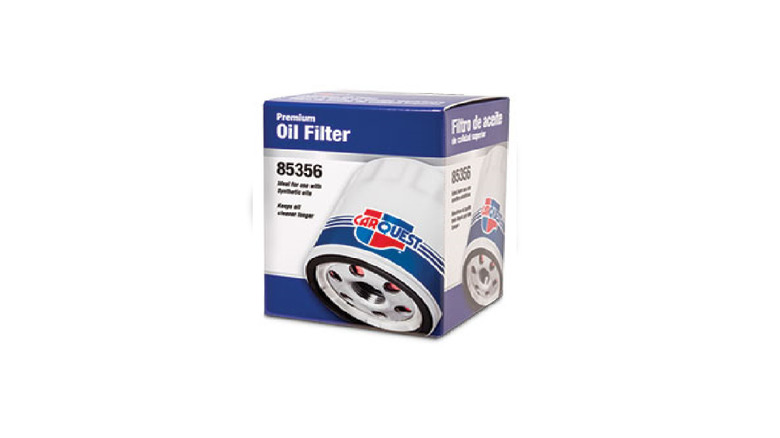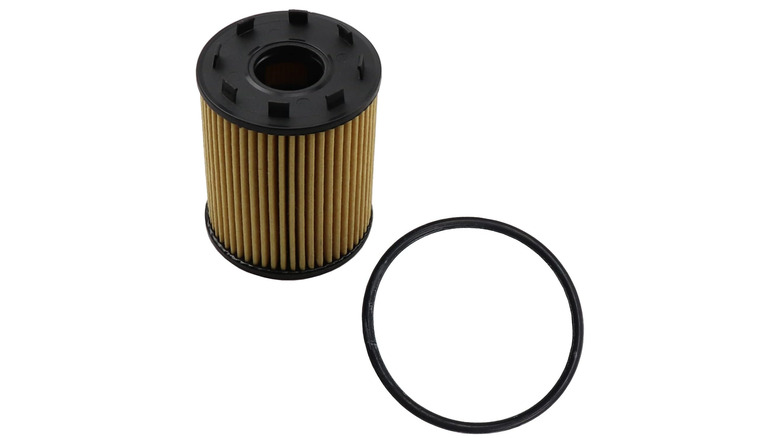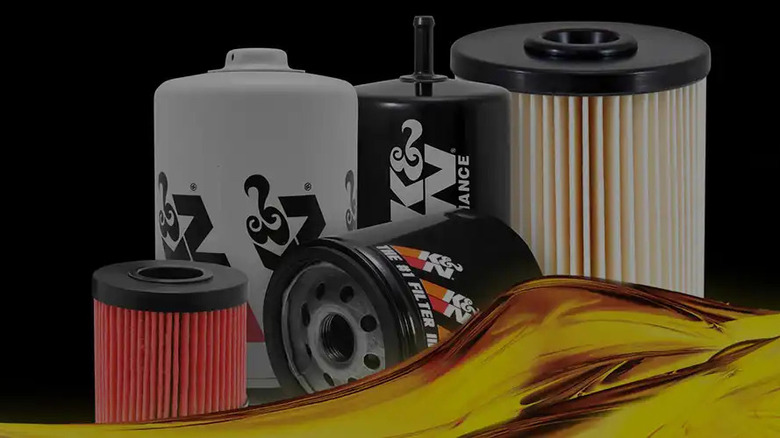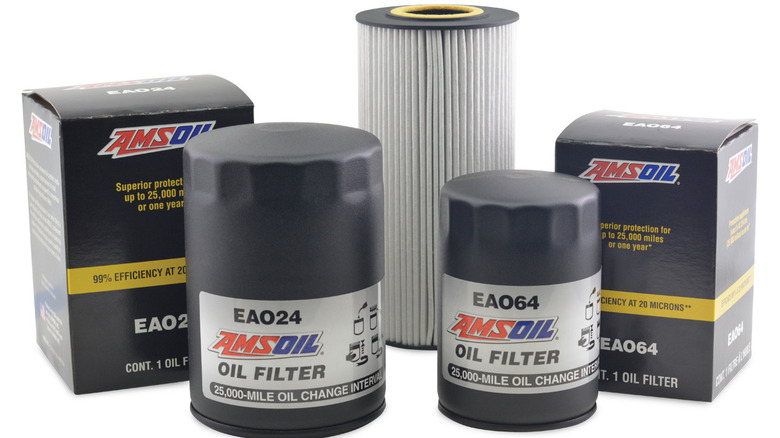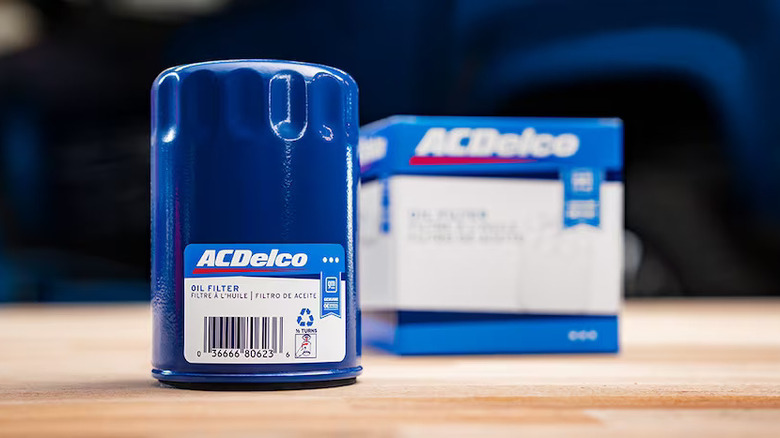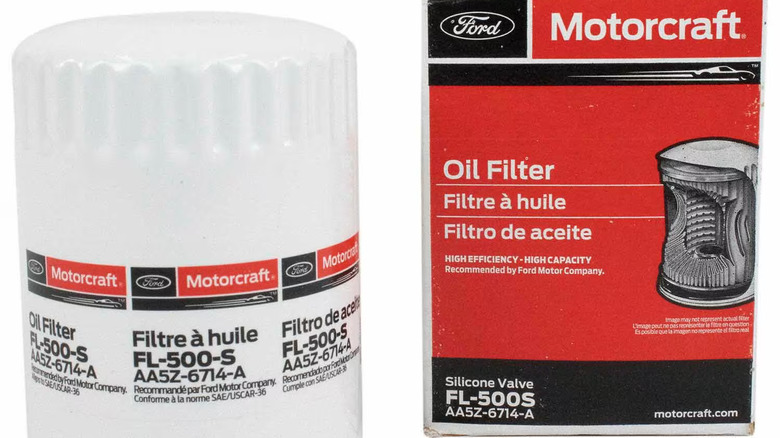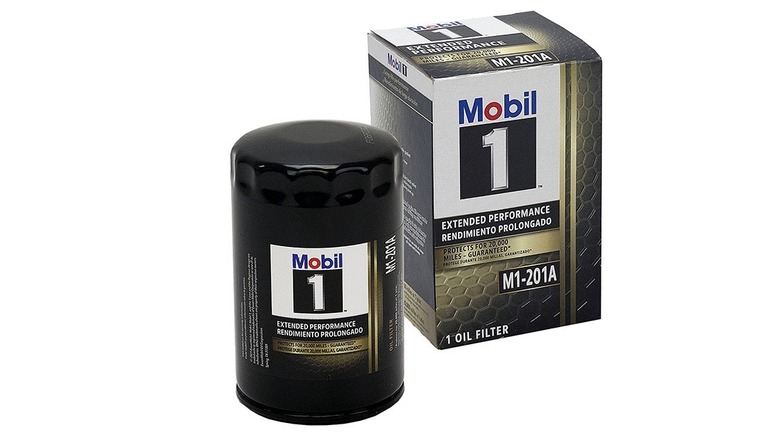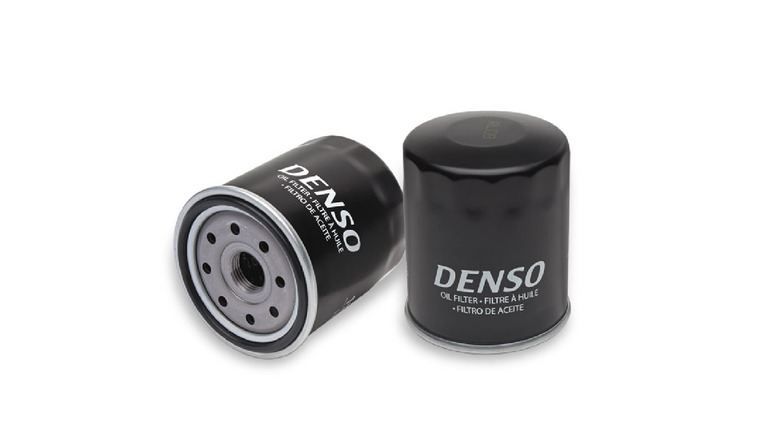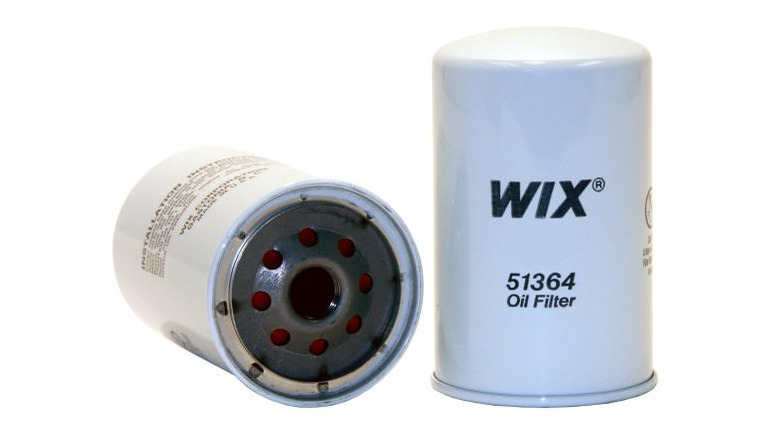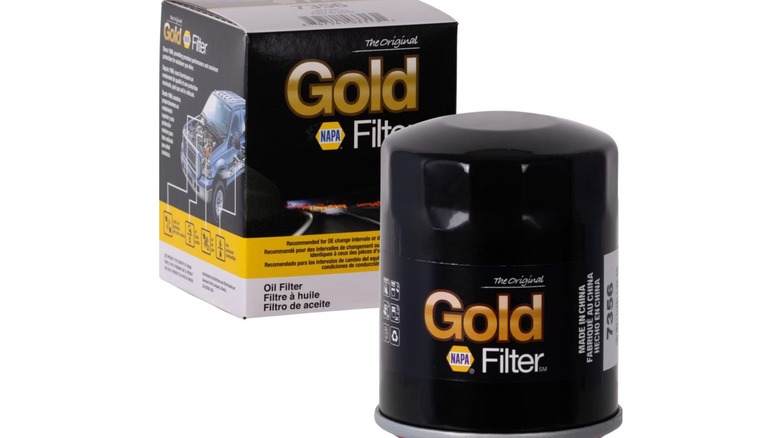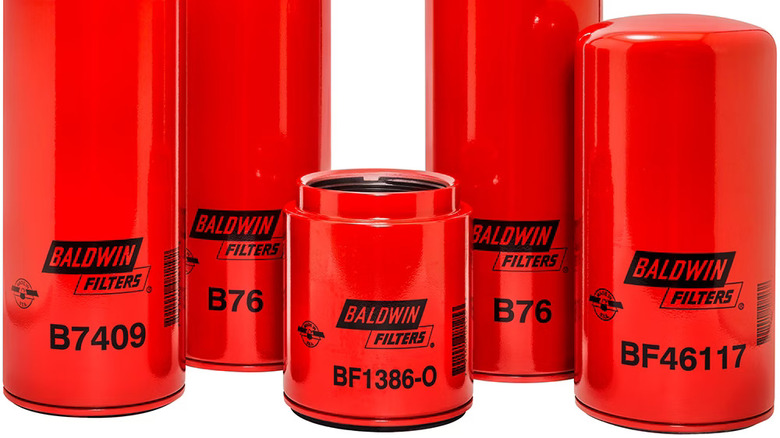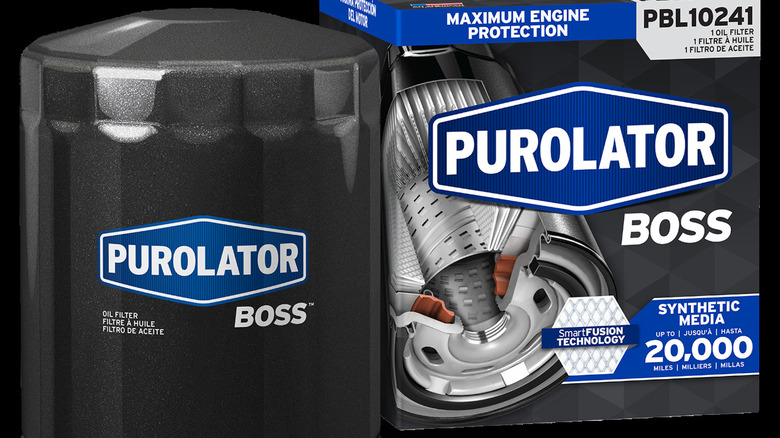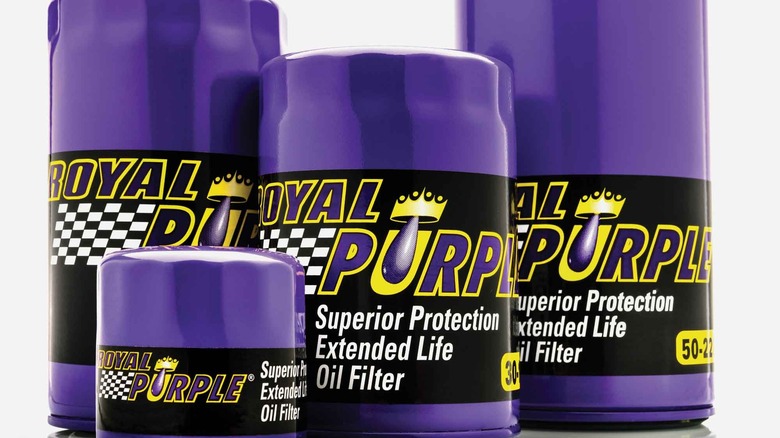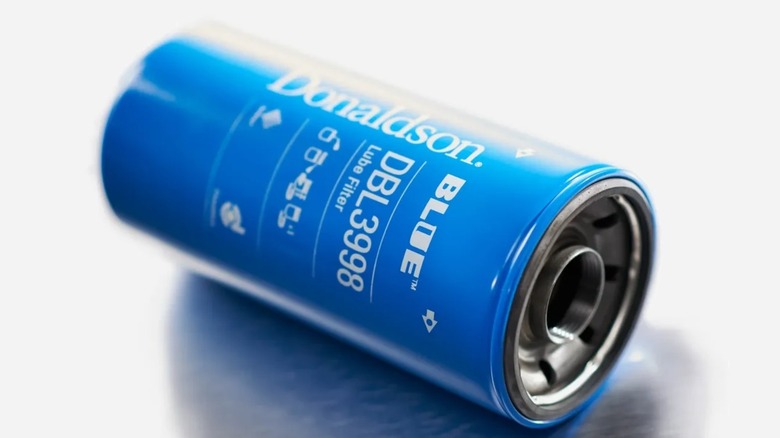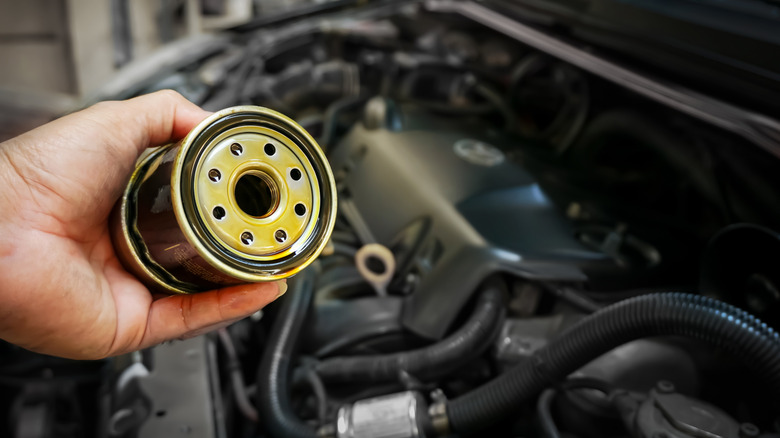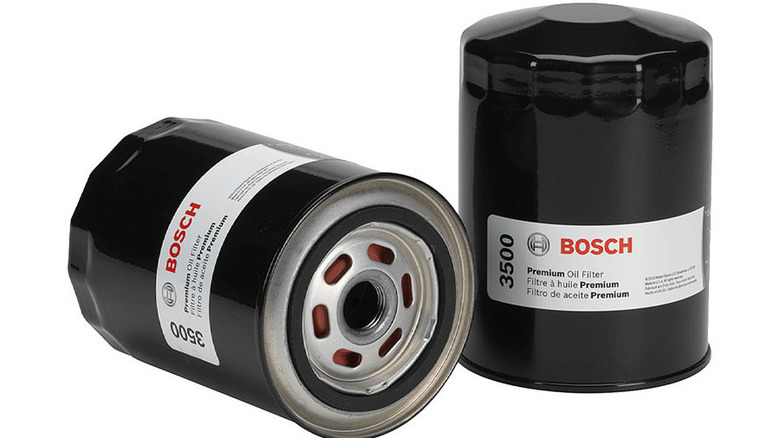21 Popular Oil Filter Brands, Ranked
We may receive a commission on purchases made from links.
We want to believe it when someone says something like "For everyday vehicles and everyday uses, any oil filter is okay." Oh, sure, no oil filter is going to cause your otherwise healthy engine to disintegrate next Tuesday, but a sub-par filter will shorten its life.
You can judge a filter by what it does, just like you judge anything else. And what an automotive oil filter does is remove stuff that shouldn't be in your oil while not interfering with your engine's ability to keep itself lubricated. This gets broken down into a few common metrics: capture efficiency (the percentage of particles above a given size that is removed), dirt-holding capacity, pressure-flow profile (how easily oil moves through the filter at a given oil pressure, viscosity, etc.), and some design/fabrication/materials issues. This last category might include what the bypass and anti-drainback valves are made of, how the filter medium itself is structured, etc.
But, again, all common filters are pretty good for daily drivers (you'll want something special for more demanding performance, including heavy-duty and commercial vehicles), assuming you change your oil on the right schedule. When you look at the numbers to compare filters, the important thing to recognize is that any particular number rarely means much by itself. A capture efficiency percentage is meaningless without a particle size, for example. All filters are 100% efficient at removing brick-sized particles. We'll touch on a few of these issues as we go.
21. Ecogard
Ecogard sells spin-on and cartridge oil filters for numerous vehicle makes and models. The company proclaims its components are durable thanks to their solid steel end caps and double-fluted center tubes. These filters are supposed to have 99% efficiency removing debris of 25 microns or larger and can last up to 10,000 miles.
Reviews of Ecogard oil filters don't corroborate the company's statements. Some users put the component's life at around 5,000 miles, just half of the distance Ecogard claims. Plus, Ecogard filters are generally regarded as a budget line, and not a stellar one at that. According to reports on BobIsTheOilGuy.com forums, some Ecogard components appear to simply re-brands of existing filters such as Baldwin, with the only change being a sticker.
Ecogard oil filters are some of the least expensive ones on the market. You can buy them for under $3 on sites such as Amazon, but the general consensus is that unless you are strapped for cash, many brands out there are superior.
20. FRAM
FRAM is probably the most well-known filter brand, instantly recognizable, and with a reputation for balancing capabilities, features, and price. FRAM has a long history of innovation in oil filters. The trouble is, while FRAM once enjoyed a sparkling reputation, professionals now tend to shy away from its products. Researcher Russ Knize, who is otherwise a temperate and moderate reviewer, encourages consumers to boycott FRAM and calls its pricey Double Guard filter "junk." FRAM oil filters are made by Trico.
FRAM is known as a manufacturer of affordable filters that come in a wide range of quality levels. The company claims a somewhat vague 95% efficiency. The filter medium is a proprietary combination of glass fibers and cellulose, and it supports a high oil flow rate. But common complaints include a thin and irregular filter medium and inferior construction (for example, it seems as if everyone mentions the cardboard endcaps FRAM uses).
19. Champ XL
Champion Laboratories has its finger in many oil filter brands, some of which you will read about later in this article. The company also produces its own line of filters, including the XL Synthetic Oil Filters, also known as the Champ XL filters.
Not to be confused with Champion Laboratories' standard Champ filters, the XL filters are primarily designed for synthetic oils and use a synthetic blend filtration media. These components have a self-proclaimed 98.7 to 99% efficiency for debris of 20 microns or larger. Moreover, Champ XL filters are supposed to last around 15,000 miles.
Pricewise, Champ XL filters vary depending on the model. If you purchase one, you will probably be looking at anywhere between $6.69 to $19.99. Moreover, different models are designed for specific cars. Regardless of compatibility limitations, all Champ XL filters utilize a durable steel construction for the shell, center tube, end caps, and baseplate. According to users, Champ XL aren't the best oil filters around, but they are well-priced for their performance. If you have to choose between standard Champ oil filters and Champ XL filters, go with the XL.
18. Supertech
Supertech is Walmart's in-house brand of car components. You can only purchase them at local Walmart stores or have them shipped to your house, but according to some users, Walmart might be phasing out several Supertech products, possibly including oil filters.
Performance varies between models. While all Supertech oil filters can handle natural and synthetic oils, some filters are designed with synthetic oils in mind. Moreover, these components can last anywhere between 10,000 and 20,000 miles, but that performance depends on the quality of the engine oil. While Walmart claims the oil filter has a 99% filtering efficiency, that rating was measured with debris of 30 microns.
When the YouTube channel Brand Ranks tested Supertech's premium oil filter's performance, the component didn't fare well against its competition, which consisted of a FRAM filter, a Mobil 1 filter, and a K&N filter. Most of these filters excelled in at least one field, such as filtering capacity or reducing flow restriction. However, the Supertech oil filter always lagged behind in either last or second-to-last place. To be fair, Supertech oil filters are fairly inexpensive, so you technically are getting more performance per dollar than other filters — but you can still buy better filters.
17. STP
STP oil filters are often regarded as budget-friendly options in the automotive aftermarket. They are readily available at many auto parts stores and can be an accessible choice for those looking to perform routine oil changes without breaking the bank. These filters are typically designed to meet basic filtration needs and are suitable for many everyday driving conditions.
That said, there are a couple of things to take into account when buying an STP filter. First and foremost, STP filters are generally constructed with basic materials, which might affect their durability and resistance to high operating temperatures and pressures. Premium filters often use higher-quality materials to ensure long-term reliability.
Additionally, STP oil filters may not offer the same level of filtration efficiency as some premium brands. While they can capture contaminants and debris from the oil, they might not excel in trapping finer particles that can potentially harm the engine over time. The efficiency of filtration is a critical factor in the performance and longevity of the engine.
STP oil filters can serve as a cost-effective option for basic filtration needs during routine oil changes. They are readily available and can be a suitable choice for those on a budget. However, it's important to recognize that they may not offer the same level of filtration efficiency, construction quality, and durability as premium brands.
16. Carquest
Carquest oil filters are considered to be mid-range options in the automotive aftermarket. They are readily available at many auto parts stores, which is convenient for consumers who want to perform routine oil changes with more reliable components. For basic needs, a Carquest filter is a decent option.
While Carquest's oil filters may not provide the highest level of filtration efficiency compared to premium brands, they are typically effective in maintaining engine cleanliness for regular driving. Carquest filters are designed to balance filtration and oil flow, ensuring that the engine receives the necessary lubrication while maintaining filtration efficiency.
Carquest went through a brief period of bouncing between Champion Laboratories and Advance Auto Parts and ultimately has come out being manufactured by Mann+Hummel. For a reasonable price, Carquest is one of the better options currently on the market.
Carquest oil filters serve as dependable options for routine oil changes and basic filtration requirements. Carquest's filters are pretty widely available, making them convenient for consumers seeking to maintain their vehicles without straying from their budgets. For those with specialized vehicles, performance requirements, or a preference for the highest level of engine protection, premium or specialized oil filters might be worth considering
15. Beck/Arnley
Beck/Arnley stands as a respected name in the automotive aftermarket landscape, renowned for its comprehensive range of automotive parts and components, among which are its dependable oil filters. With Beck/Arnley's oil filters, there are a number of factors significantly influencing their performance and suitability for different uses.
Within the realm of routine maintenance and fundamental filtration needs, Beck/Arnley oil filters have set themselves ahead as a solid, stalwart choice. Tailored to meet the rigors of everyday driving conditions, they stand as accessible options for consumers in pursuit of top-quality auto parts.
At the heart of their design lies a commitment to effective filtration, adeptly capturing contaminants and impurities that linger within the engine oil. While they may not lay claim to the loftiest heights of filtration efficiency found in more expensive filters, they dutifully uphold the task of preserving engine cleanliness during routine driving scenarios.
The construction of Beck/Arnley filters further underscores their reliability, endowing them with commendable durability and staunch resistance to the typical rigors of operating under elevated temperatures and pressures. Crafted with an eye on longevity, these filters are engineered to endure the demands commonly placed upon passenger vehicles.
Beck/Arnley oil filters are dependable companions for the regular ritual of oil changes and elemental filtration requisites. Easily accessible to consumers, they extend the convenience of vehicle maintenance without incurring extravagant costs.
14. K&N
K&N Engineering got its start making motorcycle racing parts and is now primarily known as a performance oil filter manufacturer. Its specialty is heavy-duty, high-flow, high-performance filters for use in motorsports and performance vehicles, but its consumer-grade products enjoy a slightly less glowing reputation. These filters tend to rank near the top of ratings, especially those ranking performance filters or those in which cost is not a factor.
K&N doesn't publish efficiency and filtering data. The best K&N filters are attractive, indeed. They withstand high oil pressure levels and have a higher-than-average flow rate. Users and reviewers love the one-inch nut welded to the filter casing and used to tighten the filter with a positive wrench grip. The company claims its rolled threading helps to prevent thread stripping, though it's not clear how much of a problem that really is. K&N filters are compatible with all oil types. They tend to be on the more expensive side of the market.
13. AMSOIL
AMSOIL oil filters are manufactured in the U.S. by Champion Laboratories, a white-label manufacturer that also produces a couple of oil filter brands of its own (Champ and Luber-finer). The company is known for producing great motor oil and expensive, high-quality filters. We must also acknowledge the small matter of the company's reputation as something like a multi-level marketing organization. AMSOIL is a direct sales company that was a pioneer in the synthetic oil market. Its sales representatives tend to have the unrestrained positivity of true believers, which has led some to jokingly suggest that AMSOIL is a cult. As the market for synthetics has expanded in the past two decades, competitors have largely erased AMSOIL's uniqueness, which has in turn reduced the silly comparison to nil.
AMSOIL filters offer 99% efficiency at 20 microns and are rated to last 15,000 miles (EA15K models) to 25,000 miles (EAO filters). And, in fact, AMSOIL claims that its filters are superior in every category: better efficiency, higher flow, greater capacity, and better product construction.
12. ACDelco
ACDelco has 100 years of experience manufacturing auto parts, and is the in-house manufacturer of oil filters for GM. Similar to Motorcraft, ACDelco doesn't actually manufacture its oil filters, which are made by Champion Labs, which is owned by FRAM. The company makes a broad range of filters for industrial, high-performance, and standard consumer applications. Strangely enough, ACDelco also makes one of our top-ranked AA battery brands.
ACDelco filters boast an impressive 98% capture efficiency at 25-30 microns. Its oil filters are distinguished by their nylon cores, which the company claims are 1.5 times stronger than a metal core. As you would expect from a GM OEM filter maker, ACDelco filters are generally inexpensive.
Researcher Russ Knize praises the ACDelco filter design, prefers it to several higher-end oil filter brands, and lists it as one of only three budget brands he would consider buying. Knize cites the deep filtration media pleats, which improve flow; a surprising amount of filtration media surface area; and the diaphragm-type anti-drainback valve, which is made of nitrile rubber.
11. Motorcraft
Motorcraft is owned by Ford and produces many OEM parts for the auto giant, including aftermarket oil filters built to OEM spec. The filters are actually made in the U.S.A. by Purolator Filters, which in turn is a subsidiary of German filter maker Mann-Hummel since 2013. The brand is known for providing innovative filters at reasonable prices.
Some cellulose filters take an efficiency hit. While Motorcraft doesn't publish its test results, it does claim to meet the SAE USCAR-36 minimum performance requirement of filtering with 95% efficiency at greater than 30 microns. Original research by Russ Knize, however, has the Motorcraft FL-1A performing at 99.7% (single pass) and 96% (multi-pass) on SAE J806 Filtration Efficiency testing, which only reports a percentage and not particle size.
One feature Motorcraft filters are known for is the integral pressure-relief valve that prevents collected debris from re-entering the engine when the oil is under unusually high pressure.
10. Mobil 1
Mobil 1 filters, like ACDelco's, are made by Champion Labs. And while ACDelco makes very good filters, the general consensus is that Mobil 1 makes extraordinary ones. In fact, Mobil 1 was a favorite of many of the professionals and reviewers we took a look at. Mobil 1 filters are expensive compared to other consumer-grade filters, but not prohibitively so.
The Mobil 1 brand is well-known and highly regarded. Mobil 1's performance oil filters deliver 99.7% multi-pass filtration efficiency and hold 28 grams of debris. By comparison, Motorcraft filters typically hold about 12 grams. MotorTrend shows Mobil 1's Extended Performance filter as featuring 225 square inches of filtration media, more than any other brand examined, and more than most by a mile. (It's also interesting to note that MotorTrend found the filter to be identical to the K&N Performance Gold filter.) Mobil 1 also says this particular filter can withstand nine times an oil system's normal pressure.
Incidentally, Mobil is also our top-ranked brand of motor oil.
9. DENSO
DENSO is a top-notch company in the realm of auto parts, specifically when it comes oil filters, although the company also manufactures some of the best spark plugs money can buy. DENSO themselves are the OEM for many parts and automakers and absolutely fill the industry standard. Assessing the quality of DENSO's oil filters involves recognizing the brand's reputation for precision engineering and its commitment to efficient filtration and overall product excellence.
DENSO filters are typically constructed with top-notch materials that contribute to their durability and resistance to the demanding conditions of automotive engines. These filters are designed to withstand both high temperatures and pressures, ensuring reliable performance over extended periods. As well, DENSO's reputation for precision engineering extends to its oil filters. Their design and construction are optimized to deliver consistent and reliable performance, meeting the stringent standards set by the automotive industry.
In short, DENSO oil filters are well-respected for being high-quality and great at filtering out debris. Mechanics, car enthusiasts, and pros who care about their engine's health trust them. While they cost a bit more than cheaper options, they're reliable and keep your engine in good shape, making them a smart choice for top-notch oil filtering. If you have a high-performance car or special needs, DENSO oil filters are worth the extra cost.
8. Wix
Wix might not be a household name, but the company brags about having invented the common spin-on oil filter and supplies OEM filters for many auto manufacturers. The North Carolina company's filters are increasingly manufactured by parent company Mann-Hummel, though some might still be made by Champion Labs. Wix filters are generally made for standard consumer automobiles rather than for heavy-duty and performance applications, and they are made for synthetic oil. They are generally affordable, though their prices are a little high for what is thought of as a budget brand.
Wix filters sport a 99% maximum efficiency at 35 microns, and 95% at 20 microns. The specs are hard to generalize about because, as with its many OEM filters, Wix tailors its design and manufacturing to the requirements of the auto manufacturers. Knize lists Wix as one of only three budget oil filter brands he would consider, and describes Wix as "a very well-made filter."
7. NAPA
NAPA's oil filters are divided into several categories with names such as Silver, Gold, Platinum, and Proselect." As one might expect, these categories boast differing degrees of performance and efficiency, and they are made of different materials. However, specific filters are also designed for different purposes.
Proselect, Silver, and Gold filters utilize a cellulose filtering media –- while an enhanced cellulose media for Gold filters. Proselect and Silver are best paired with vehicles that are used for errands and run on conventional oil. These filters last around 4,000 miles. The Gold filters, meanwhile, are designed for the average commuter and excel with synthetic and synthetic blend oils. These filters last much longer -– around 7,500 miles -– and have a 96% filtering efficiency for contaminants of 20 microns or bigger and 99% efficiency at 30 microns.
Napa's final line of filters, the Platinum, are designed for towing vehicles and cars that either venture up mountains or through extreme weather conditions. Unlike the prior lines, Platinum filters use a synthetic filter media. While they last as long as Gold filters, Platinum filters have double the capacity. However, this upgrade comes at the cost of filter efficiency, as Platinum filters have a 99% efficiency rating with contaminants of 35 microns or larger.
6. Baldwin
Manufactured by Parker Engine Mobile Aftermarket Division, Baldwin filters are known to be reliable for heavy-duty uses like trucks. And, indeed, Baldwin is often thought of as primarily a maker of oil filters for trucks. Baldwin makes premium filters available for a premium price, but these are only at the upper range one typically finds for consumer filters.
Baldwin filters feature reliable metal and nitrile valves and high-flow filters. They have a good efficiency rating, 85.44% at 12-30 microns. Baldwin's spring-loaded bypass valve keeps oil moving, critical in every application but perhaps particularly so in heavy-duty/performance uses.
Baldwin says that its position as an actual manufacturer rather than merely an assembler of oil filters means that it can control quality and costs with much more precision. The company says its products are built to the exacting specifications of OE buyers and other specific applications, and exceed industry standards in all cases.
5. Purolator
This 90-year-old manufacturer's filters are actually owned and manufactured by Mann-Hummel in Germany. Purolator claims to have invented the oil filter, and the company name is a shortening of "pure oil later." (One reads this factoid a lot, but no one ever seems to explain what the virtue of "later" is supposed to be.)
Purolator oil filters are well-made, which you might expect from a German manufacturer, and more impressively, they're well-made across a line of 2,000 filters. Purolator's best filters can deliver as much as 99% efficiency at 20 microns. And they do it for as long as 10,000 miles. Many of the filters studied by Russ Knize are Purolator clones, and Purolator is the third of the three budget oil filter brands Knize says he would be willing to buy. If there's a knock on the Purolator design, it's that the density of the filter media causes reduced oil flow, which makes the filters generally unsuitable for high-performance applications ... but others rate the flow fairly high.
4. Royal Purple
A relatively new brand introduced in 1986, Royal Purple has quickly garnered a great reputation for high-quality, reliable filters. Royal Purple filters are manufactured by Champion Labs. The filters are heavy duty but are well-priced, perhaps only escaping the "budget" label by virtue of their very good performance ratings. Before making oil filters, Royal Purple was primarily a manufacturer of motor oil.
The filters are expensive, but enjoy a well-deserved cachet among auto enthusiasts. Royal Purple reports an extraordinary 99% efficiency at 25 microns, and it's 80% efficient at 10-24 microns. Royal Purple are high-flow filters in spite of this filtration efficiency (efficiency is usually correlated to restricted oil flow). The filters are supposed to be usable for as many as 10,000 miles. The filtration media is 100% synthetic micro-glass, a fine material which the company says is responsible for making its efficiency numbers possible while still providing high rates of oil flow.
3. Donaldson
Donaldson Filtration Solutions, alternatively known as Donaldson Company Inc., specializes in filtration devices for industries such as private, aerospace, and military. More importantly, Donaldson holds several awards and patents related to its filters.
Donaldson's filters fall into three labels: Standard, Blue, and Competitive Fit. While each brand is designed for heavy-duty diesel engines, they are all reportedly high quality. Moreover, many filters are compatible with the proprietary Donaldson Filter Minder Connect system. These devices can monitor the filters of entire vehicle fleets and alert users when a filter needs maintenance, either in an emergency or prophylactically.
Each Donaldson filter is built differently, as each is designed for a different vehicle. Standard Donaldson filters are intended for regular heavy-duty diesel engines and use silicone-base treated cellulose filter media. These filters have a 99% efficiency for debris anywhere between three and 36 microns. Meanwhile, Donaldson's Blue line is built for heavy-duty trucks and uses a patented Synteq filtering (a combination of cellulose and melt-blown synthetic media) to remove 90% of contaminants as small as 10 microns. Finally, Competitive Fit filters are designed specifically for Cummins ISX and X15 engines and have 98% efficiency with debris 15 microns or bigger.
2. OEM filters
Here's our unsurprising surprise for you, and you might have already figured it out. There are only a handful of actual oil filter manufacturers, and many of those make OEM filters. Holding all the variables at reasonable levels — a vehicle that's in reasonably good shape, subject to mature driving habits and a steady oil-changing routine, etc. – you will always be rewarded with acceptable performance from your vehicle's OEM oil filter.
The reason is simple enough: OEM oil filters are invariably manufactured to the specifications of the automaker. The automaker has a lot to lose from poor OEM filters, and the OEM filter manufacturer has a lot to lose if the automaker gets dissatisfied with its work.
A little research will tell you which OEM filter your particular car takes, and whether rebranded but otherwise identical filters are available. Do, however, take care when buying online, as counterfeit OEM products are increasingly common.
1. Bosch
If there's a real consensus about anything in the automotive oil filter industry, it's that Bosch makes very good, surprisingly affordable oil filters. Prior to 2013, Bosch filters were actually manufactured by other companies, but Bosch now makes their own.
Bosch filters are extremely well-made and precise, in the German mode. Their capacity ranges from 13 to 29.1 grams, but is generally cited as 14 grams. Bosch filters are mostly 99% efficient at 40 microns. Bosch Premium filter is 99.9% efficient and filters down to 20 microns. It accomplishes all this with a relatively unimpressive 133 square inches of filter medium — about on par with Purolator, but far below some companies with worse efficiency numbers. The Bosch Premium filter's capacity of 14 grams won't win any awards, but it's also not uncommonly low. The filters use an "exclusive" blend of cellulose and glass fiber (presumably different from FRAM's "proprietary" blend).
Methodology
What exactly makes an oil filter the best oil filter? In ranking the 15 best oil filters, a few key considerations were kept in mind. First and foremost was understanding the experiences and opinions of actual users. Consumer reviews, feedback, and ratings from various platforms to gauge overall satisfaction with each oil filter were all taken into consideration.
Other critical sentiments, including any reviews and opinions from critical sources, were also taken into consideration. Also taken into consideration was the overall value proposition offered by each oil filter, taking into account factors such as price, warranty coverage, and additional features or benefits. Filters that offered exceptional performance and durability at a competitive price point were prioritized.
By considering these key factors, the 15 best oil filters became clear. Ultimately, as stated earlier, there is a popular sentiment that any oil filter can be the best for you. A more premium oil filter may be a better fit depending on your needs, and the most affordable oil filter might not be a bad fit for your needs as well. At the end of the day, the best oil filter will completely depend on you and your needs.
